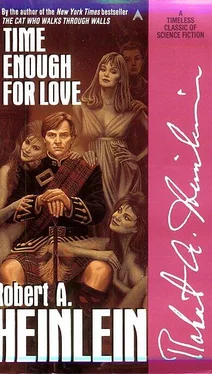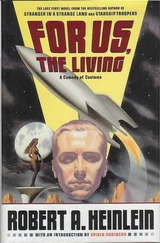Robert Heinlein - Time Enough For Love
Здесь есть возможность читать онлайн «Robert Heinlein - Time Enough For Love» весь текст электронной книги совершенно бесплатно (целиком полную версию без сокращений). В некоторых случаях можно слушать аудио, скачать через торрент в формате fb2 и присутствует краткое содержание. Жанр: Фантастика и фэнтези, на английском языке. Описание произведения, (предисловие) а так же отзывы посетителей доступны на портале библиотеки ЛибКат.
- Название:Time Enough For Love
- Автор:
- Жанр:
- Год:неизвестен
- ISBN:нет данных
- Рейтинг книги:3 / 5. Голосов: 1
-
Избранное:Добавить в избранное
- Отзывы:
-
Ваша оценка:
- 60
- 1
- 2
- 3
- 4
- 5
Time Enough For Love: краткое содержание, описание и аннотация
Предлагаем к чтению аннотацию, описание, краткое содержание или предисловие (зависит от того, что написал сам автор книги «Time Enough For Love»). Если вы не нашли необходимую информацию о книге — напишите в комментариях, мы постараемся отыскать её.
Time Enough For Love — читать онлайн бесплатно полную книгу (весь текст) целиком
Ниже представлен текст книги, разбитый по страницам. Система сохранения места последней прочитанной страницы, позволяет с удобством читать онлайн бесплатно книгу «Time Enough For Love», без необходимости каждый раз заново искать на чём Вы остановились. Поставьте закладку, и сможете в любой момент перейти на страницу, на которой закончили чтение.
Интервал:
Закладка:
'"Grandfather Lazarus, what did you do during this war?" Me? I sold Liberty Bonds and made four-minute speeches and served both on a draft board and a rationing board and made other valuable contributions-until the President called me to Washington, and what I did then was hush-hush and you wouldn't believe it if I told you. None of your lip, boy; I was telling you what David did.
Ol' David was an authentic hero. He was cited for gallantry and awarded a decoration, one that figures into the rest of his story.
Dave had resigned himself to-or looked forward to, as may be-retiring at the rank of lieutenant commander, as there weren't many billets higher than that in the flying boats. But the war jumped him to lieutenant commander in a matter of weeks, then to commander a year later, and finally to captain, four wide gold stripes, without facing a selection board, taking a promotion examination, or commanding a vessel. The war was using them up fast, and anyone not killed was promoted as long as he kept his nose clean.
Dave's nose was clean. He spent part of the war patrolling his country's coasts for enemy underwater vessels-"combat duty" by definition but hardly more dangerous than peacetime practice. He also spent a tour turning clerks and salesmen into fliers. He had one assignment into a zone where actual fighting was going on, and there he won his medal. I don't know the details, but "heroism" often consists in keeping your head in an emergency and doing the best you can with what you have instead of panicking and being shot in the tail. People who fight this way win more battles than do intentional heroes; a glory hound often throws away the lives of his mates as well as his own.
But to be officially a hero requires luck, too. It is not enough to do your job under fire exceptionally well; it is necessary that someone-as senior as possible-see what you do and write it up. Dave had that bit of luck and got his medal.
He finished the war in his nation's capital, in the Naval Bureau of Aeronautics, in charge of development of patrol planes. Perhaps he did more good there than he did in combat, since he knew those multiple-engine craft as well as any man alive, and this job put him in position to cut out obsolete nonsense and push through some improvements. As may be, he finished the war at a desk, shuffling papers and sleeping at home.
Then the war ended.
Dave looked around and sized up the prospects. There were hundreds of Navy captains who, like himself, had been lieutenants only three years earlier. Since the peace was "forever," as, politicians always insist, few would ever be promoted. Dave could see that he would not be promoted; he had neither the seniority, the traditionally approved pattern of service, nor the right connections, political and social.
What he did have was almost twenty years' service, the minimum on which to retire at half pay or he could hang on until he was forced to retire through failure to be selected for admiral.
There was no need to decide at once; twenty-year retirement was a year or two off.
But he did retire almost at once-for medical reasons. The diagnosis was "psychosis situational," meaning that he went crazy on the job.
Ira, I don't know how to evaluate this. Dave impressed me as one of the few completely sane men I ever knew. But I wasn't there when he retired and "psychosis situational" was the second commonest cause for medical retirement of naval officers in those days but-how could they tell? Being crazy was no handicap to a naval officer, any more than it was to an author, a schoolteacher, a preacher, or several other esteemed occupations. As long as Dave showed up on time and signed paper work some clerk prepared and never talked back to his seniors, it would never show. I recall one naval officer who had an amazing collection of ladies' garters; he used to lock himself into his stateroom and examine them-and another one who did exactly the same with a collection of paper stickers used for postage. Which one was crazy? Or both? Or neither?
Another aspect of Dave's retirement requires knowledge of the laws of the time. Retiring on twenty years' service paid half pay-subject to income tax which was heavy. Retiring for medical disability paid three-quarters pay and was not subject to income tax.
I don't know, I just don't know. But the whole matter fits Dave's talent for maximum results with minimum effort. Let's stipulate that he was crazy-but was he crazy like a fox?
There were other features of his retirement. He judged correctly that he had no chance of being selected for admiral-but that citation for gallantry carried with it an honorary promotion on retirement-so Dave wound up the first man in his class to become admiral, without ever commanding a ship much less a fleet-one of the youngest admirals in history, by his true age. I conjecture that this amused the farm boy who hated to plow behind a mule.
For at heart he was still a farm boy. There was another law for the benefit of veterans of that war, one intended to compensate lads who had had their educations interrupted by having to leave home to fight: subsidized education, one month for every month of wartime service.
This was intended for young conscripts, but there was nothing to keep a career officer from taking advantage of it; Dave could claim it and did. With three-quarters pay not subject to taxation, with the subsidy-also not taxable-of a married veteran going to school, Dave had about the income he had had on active duty. More, really, as he no longer had to buy pretty uniforms or keep up expensive social obligations. He could loaf and read books, dress as he pleased, and not worry about appearances. Sometimes he would stay up late and prove that there were more optimists playing poker than mathematicians. Then sleep late. For he never, never got up early.
Nor did he ever again go up in an aeroplane. Dave had never trusted flying machines; they were much too high in case they stalled. They had never been anything to him but a means to avoid something worse; once they had served his purpose, he put them aside as firmly as he had put aside fencing foils-and with no regrets in either case.
Soon he had another diploma, one which stated that he was a Bachelor of Science in agronomy-a "scientific" farmer.
This certificate, with the special preference extended to veterans, could have obtained him a civil service job, telling other people how to farm. Instead, he took some of the money that had piled up in the bank while he loafed in school and went way back into those hills he had left a quarter of a century earlier-and bought a farm. That is, he made a down payment, with mortgage on the balance through a government loan at a-subsidized, of course-very low rate of interest.
Did he work the farm? Let's not be silly; Dave never took his hands out of his pockets. He made one crop with hired labor while he negotiated still another deal.
Ira, the completion of Dave's grand plan involves one factor so unbelievable that I must ask you to take it on faith-it is too much to ask any rational man to understand it.
At that pause between wars, Earth held over two billion people-at least half on the verge of starvation. Nevertheless-and here is where I must ask you to believe that I was there and would not lie to you-despite this shortage of food which never got better other than temporarily and locally in all the years that followed, and could not, for reasons we need, not go into-in spite of this disastrous shortage, the government of David's country paid farmers not to grow food.
Don't shake your head; the ways of God and government and girls are all mysterious, and it is not given to mortal man to understand them. Never mind that you yourself are a government; go home tonight and think about it-ask yourself if you know why you do what you do-and come back tomorrow and tell me.
Читать дальшеИнтервал:
Закладка:
Похожие книги на «Time Enough For Love»
Представляем Вашему вниманию похожие книги на «Time Enough For Love» списком для выбора. Мы отобрали схожую по названию и смыслу литературу в надежде предоставить читателям больше вариантов отыскать новые, интересные, ещё непрочитанные произведения.
Обсуждение, отзывы о книге «Time Enough For Love» и просто собственные мнения читателей. Оставьте ваши комментарии, напишите, что Вы думаете о произведении, его смысле или главных героях. Укажите что конкретно понравилось, а что нет, и почему Вы так считаете.












